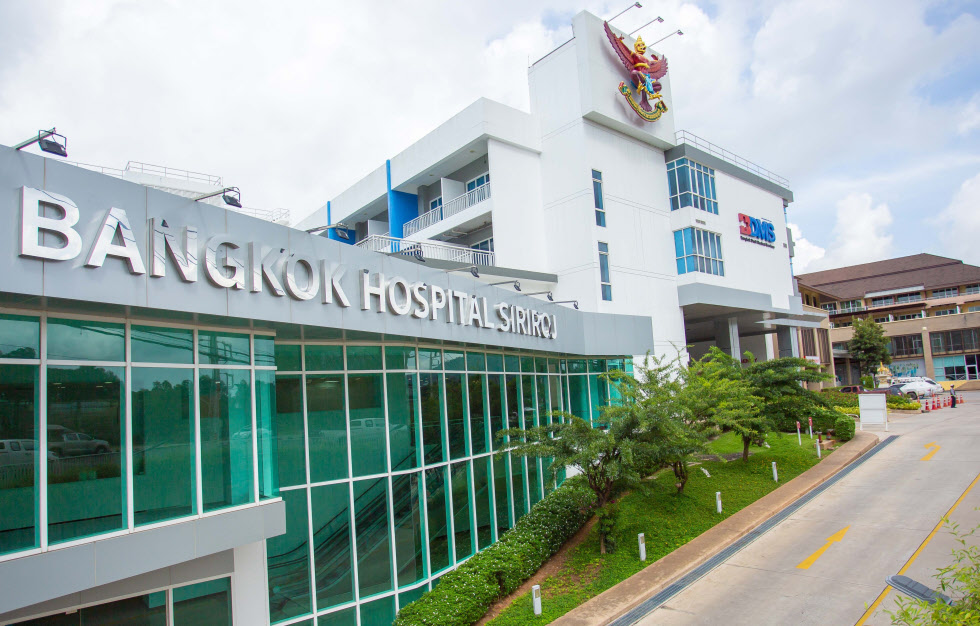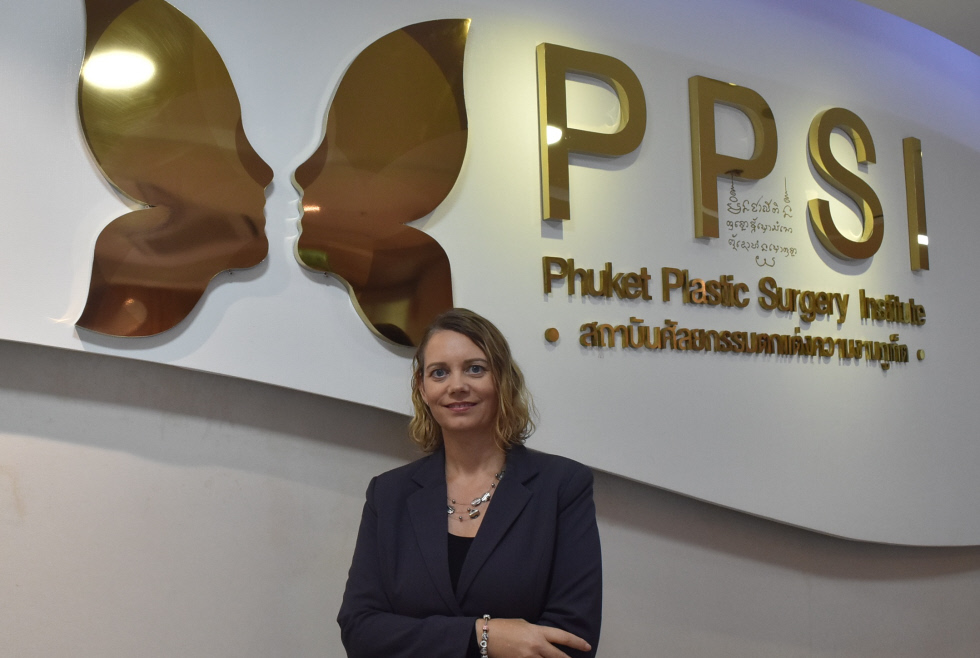Lotte Dietrich from Denmark is a familiar face for Scandinavian regulars seeking medical care or being medical tourism patients at one of Phuket’s private hospitals – especially so given that she has been around since the time of the 2004 tsunami.
Lotte had arrived to Phuket prior to the tsunami and was offered a job with the hospital as Scandinavian coordinator and marketing person at Bangkok Hospital Siriroj (Phuket International Hospital).. It had realised the need for such a person to help patients in emergency situations. Therefore, Lotte has been with the hospital for over 13 years, and is today in charge of communication and marketing (also her educational background), while the hospital also still employs a coordinator looking after Scandinavia.

“Over the years my personal role has evolved from being patient contact-focused to be more on the management side, and I have a team of coordinators that are working and handling our enquiries. So we actually have nine coordinators doing the correspondence with patients seven days a week,” explains Lotte.
“I had a year off, came to Thailand, found a job and stayed,” is the simple explanation how her long-lasting career in Phuket paradise once started.
Dip in Scandinavians
And reflecting on the development she says: “Thailand has really changed over the past 15 years, including a lot of improvements within health care; massive improvement in the services and the quality but also in the volume of patients coming in. And Phuket has also changed a lot, having evolved from a major tourist destination into becoming a world-class tourist destination in the past decade. Now we welcome 11 million tourists yearly, so it’s a busy island.”
As for the Scandinavian countries and in relation to medical tourism this has changed as well: “Over the years we have definitely seen a shift in the Scandinavian market; we still have a lot of families that come here on holiday, where normally three generations travel together. However, because Phuket has become so busy we tend to see Scandinavians going to Khao Lak, Krabi and Koh Lanta. They go a bit further away from international hospital services. Therefore we also have ambulance services in Khao Lak and also have partners for that in Krabi and Koh Lanta. If people need care they can be transferred to this hospital.”
“We have also seen a dip in the number of Scandinavian tourists in the last few years in Phuket. This year it’s ten per cent down from last year,” comments Lotte as we talk in July.
Travellers to those other destinations will use local clinics for minor things, accidents or illnesses, but for more serious injuries insurance companies or embassies recommend that they go to an international hospital with international standards, she explains.
“When patients are transferred to us we work with SOS International, Falck Global Assistance etc. in providing care and regarding repatriation to Scandinavia.”
“In terms of medical insurance the Scandinavian market is still very important for us and we have very good cooperation with all the partners to ensure that everything goes smooth when a patient is admitted and we also have communication between the insurance company doctors and our doctors here.”
Unsurprisingly to expats in Thailand, motorbike accidents are among the most common reasons for medical care need.
“Unfortunately there are lots of inexperienced drivers of motorbikes here in Phuket. We have a trauma centre and because we are situated right by a major road we receive a lot of such cases. Most such accidents are minor but because people are wearing only flip flops, shorts and t-shirts abrasive wounds are very common. And we also see serious wounds or head trauma on a regular basis.”
Other than that the hospital also treats mosquito-borne illnesses, but this mostly concerns expats as accommodation where tourists stay are protected against mosquitoes.

Favourable destination
The main focus is otherwise of course on medical tourism, where Bangkok Hospital Siriroj works with about 50 agencies from all over the world. These are places and areas where people are interested in travelling abroad for medical care.
“Our main markets are Australia and New Zealand and we also have Scandinavians and other Europeans coming here for surgery. Right now our growing markets are China and Russia. We also can be found easily online, so a lot of our patients contact us via email or social media and make an enquiry and then will book surgery directly with us.”
In terms of competitiveness Lotte highlights: “First of all Thai doctors have a very high level of education and the qualifications they need to meet are on par with international standards. So the quality patients can expect is the same as say to Singapore, the US or any place in Europe.”
The destination is also favourable: “We find that patients much rather prefer Phuket than Bangkok, Kuala Lumpur or Singapore for their medical treatment because of the advantage that they can recuperate at a hotel by the beach. Hence, Phuket has a huge advantage with regards to attracting overseas medical travellers.”
“As for cost, our overhead is a lot lower here so our patients expect to save about 50 per cent on surgeries but of course they have their flight and hotel expenses too. So many people end up having a holiday in Phuket for the same price as a surgery would cost back home.”
And for dental care needs people from for instance Scandinavia can save the cost of the flight to Thailand or more.
However, since the hotels can be quite expensive during high season the hospital has noticed that for medical tourism its high season is actually the opposite: most patients during the “green season” from May to October.
Also, currently the very strong Thai currency is not favourable: “It has become more expensive for foreigners to have their surgery here and this has impacted our patient number in the last year, especially because our main market Australia, with a weak Aus dollar at the moment.”
“We do low seasons campaigns to try to get people to book, and we have been implementing a lot of cost-saving measures to ensure we are competitive on the prices here in Phuket,” she adds.
Lotte also travels to meet with representatives, mainly in Australia, New Zeeland.
“We have contracts with referral agencies in these countries to make sure that their standard is up to what we expect from them and also to ensure that we have a good working relationship. One of the main things is the pre-screening, so we put a lot of effort into training to ensure that people are fit for surgery before they even fly in to Phuket.”
She adds that as a hospital they are very interested in the Asean market too. “We are seeing a surge in patients coming from neighbouring countries for all kinds of elective treatments, which is not just beauty treatments. Thailand is one of the most advanced countries within healthcare in the region.”

Plastic Surgery
The hospital’s Phuket Plastic Surgery Institute is the biggest on the island. “We have 11 plastic surgeons that can do a variety of aesthetic plastic surgeries. About 60 per cent are breast augmentations or breast implants, and then 40 per cent are other procedures like breast lift, liposuction, tummy tuck, facelift and rhinoplasty.”
“For medical tourism we communicate with patients quite extensively and do pre-screening before they even book their flight. We want them to fill out a medical questionnaire so we know if there are any contra indications for having surgery. And we also ask for photos so that the doctor can review and provide initial surgical recommendations. We want people to know what to expect before-hand so they arrive with realistic expectations about the outcome. We also use this information for price estimate and we also need to inform people how long they need to stay in Phuket after their surgery for proper follow-up.”
One group of people spends money on looking younger, while 85 percent of the customers over all are female.
“But we are seeing a trend that more and more people are having surgery, both men and women, and they often start having facelift surgery in their fifties. In fact if people wait for too long or they have a lot of damage to the skin from the sun it is very limited what the doctor can do, so it’s better to start younger.”
As for expat living on Phuket Lotte comments infrastructure improvements and that it is still possible to find quiet spots despite increasing tourism.
“For those of us who live here it can get busy at times but if you don’t live in the main tourist areas Phuket still has a lot of untouched places, local villages and communities. There’s definitely something for everyone.”
She mentions Nai Yang and Mai Khao as her personal favourites: “beautiful and un-crowded beaches.”
Personally she lives Chalong as it is relatively close to the hospital as well as to international schools.
“And we actually have a lot of Scandinavians living in southern Phuket and there are a number of Scandinavian-owned restaurants and bars too.”
